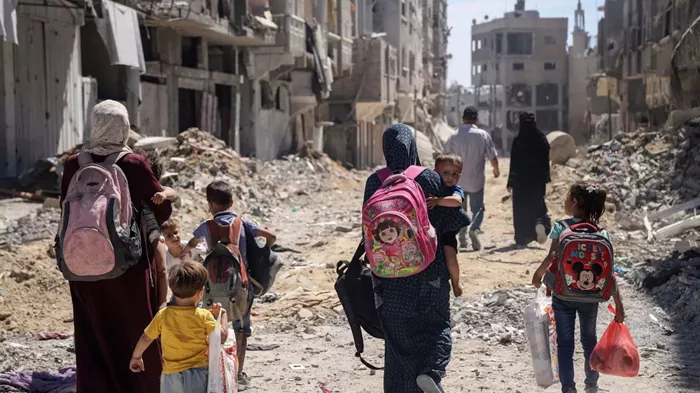Is the Gaza War Mentioned in the Bible? Joel Rosenberg Discusses Israel’s War Against Hamas and Its Connection to the ‘End Times’
The ongoing conflict between Israel and Hamas in Gaza has drawn widespread attention, not just for its immediate geopolitical implications but also for its potential connection to biblical prophecy. Joel Rosenberg, a well-known author and expert on the Middle East, has recently delved into this topic, exploring whether the current Gaza War is a fulfillment of end times prophecies as described in the Bible.
The Connection Between Gaza and the Bible
Gaza is one of the most frequently mentioned locations in the Bible, referenced over 20 times. Rosenberg points out that these references often portray Gaza as a place of wickedness, hostility towards Israel, and a target of divine judgment. For example, in the Book of Judges, Gaza is a Philistine stronghold and a symbol of opposition to Israel. The Philistines, who were ancient enemies of Israel, used Gaza as a base to launch attacks against the Israelites, and this enmity is reflected in the biblical narrative.
In the prophetic books, Gaza is depicted as a place that will face severe judgment from God. For instance, the prophet Zechariah warns of the destruction of Gaza and the death of its leaders. This theme of judgment is consistent throughout the prophetic texts, where Gaza’s hostility towards Israel is met with divine retribution.
The Role of Media and Public Perception
In his analysis, Rosenberg also touches on the role of the media in shaping public perception of the conflict. He argues that much of the mainstream media has taken a biased stance against Israel, often portraying it as the aggressor while downplaying the atrocities committed by Hamas. This, he suggests, is part of a larger spiritual battle, where truth is often distorted, and Israel is unfairly maligned.
Rosenberg points out that the media’s portrayal of the conflict can influence international opinion and even impact the decisions of world leaders. He urges Christians to seek out reliable sources of information and to support media outlets that provide fair and accurate reporting on the situation.
The Call to Prayer and Humanitarian Aid
Amidst the ongoing violence, Rosenberg emphasizes the importance of prayer and humanitarian aid. He calls on Christians to pray for peace in the region, for the protection of innocent lives, and for wisdom for Israel’s leaders. He also encourages Christians to support organizations that are providing humanitarian aid to those affected by the conflict, both in Israel and in Gaza.
Rosenberg highlights the biblical mandate to love and care for one’s neighbors, including those who may be considered enemies. He notes that while the Bible speaks of judgment for those who oppose Israel, it also calls for compassion and outreach to those who are suffering. This dual approach—standing firm in support of Israel while also showing love and mercy to the people of Gaza—is, according to Rosenberg, the Christian response to the current crisis.
The Historical and Prophetic Significance of Gaza
Gaza’s history is deeply intertwined with the story of Israel. From its role as a Philistine city in the time of Samson to its mention in the prophecies of Zechariah and Amos, Gaza has long been a place of conflict and judgment in the biblical narrative.
The prophetic books of the Bible, particularly those written before and after the fall of Judah to the Babylonians, often speak of a coming judgment for Gaza. These prophecies describe a time when Gaza will face destruction and its leaders will be cut off. For those who view the Bible as a prophetic text, these references to Gaza may seem eerily relevant in light of the current conflict.
A Complex and Ongoing Conflict
The conflict between Israel and Hamas is complex, with deep historical, political, and religious roots. While some may see the current war as a fulfillment of biblical prophecy, Rosenberg cautions against oversimplification. The Bible does speak of conflicts in the region, and Gaza is certainly a significant location within the biblical narrative. However, the exact role of these events in the broader scope of prophecy is a matter of interpretation.
Rosenberg’s discussion of the Gaza War highlights the need for a balanced and thoughtful approach. Christians are called to be watchful and discerning, to pray for peace, and to support those who are suffering. At the same time, they are also called to stand firm in their support of Israel and to seek out the truth amidst a landscape of biased media coverage.
Conclusion: Looking Forward with Hope
As the conflict continues, Rosenberg urges Christians not to lose hope. The Bible, he reminds us, is ultimately a story of redemption and restoration. While there may be dark days ahead, the final victory belongs to God. Christians are called to be a light in the darkness, to pray for peace, and to work towards the day when swords will be beaten into plowshares and nations will no longer learn war.
In the meantime, Rosenberg’s analysis of the Gaza War and its potential connection to biblical prophecy serves as a reminder of the importance of vigilance, prayer, and compassion. Whether or not the current conflict is a fulfillment of end times prophecies, it is clear that the region remains a focal point of both historical and prophetic significance. As such, it warrants the attention and prayers of Christians around the world.

